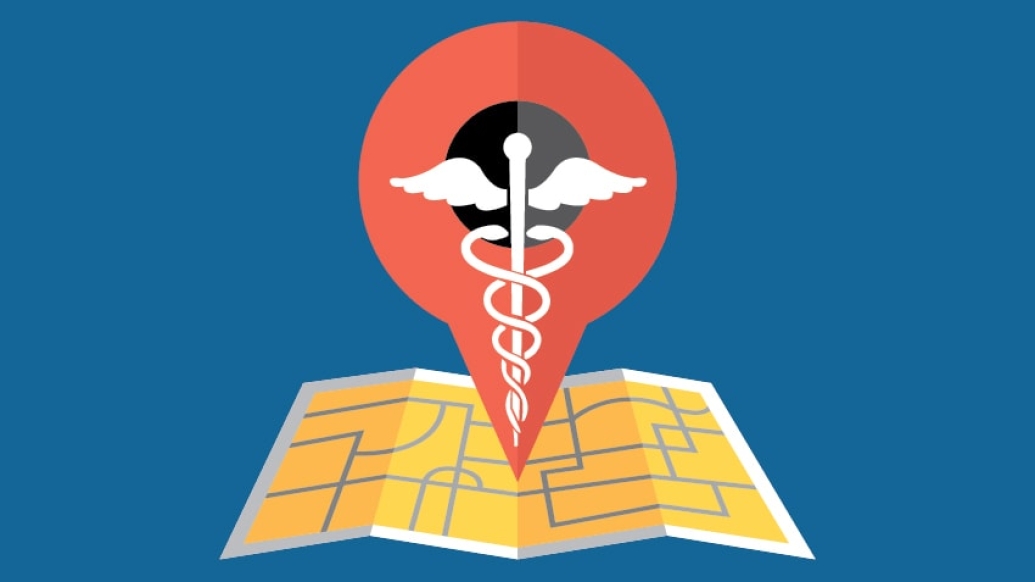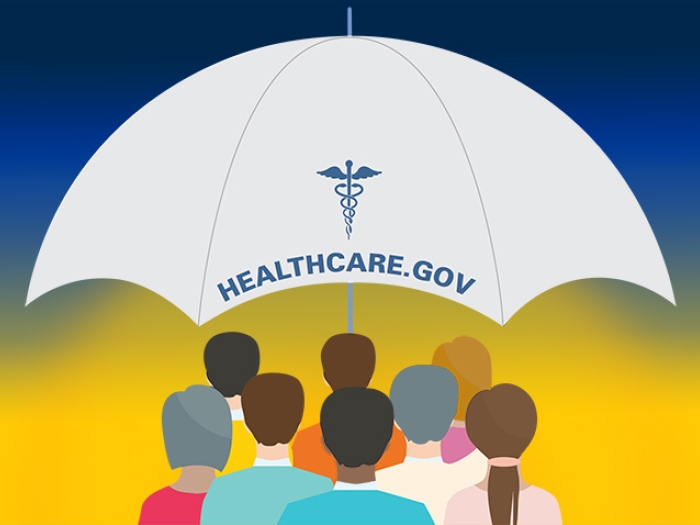No matter what kind of coverage you have — or whether you have health insurance at all — this is a crucial time for getting informed and making decisions.
11:00 AM
Author |

It may be jacket weather in Michigan right now. But not long from now, everyone will need winter coats to protect them from the cold.
LISTEN UP: Add the new Michigan Medicine News Break to your Alexa-enabled device, or subscribe to our daily audio updates on iTunes, Google Play and Stitcher.
Jacket weather is also the time to think about another kind of protection that will come in handy this winter: the protection of health insurance. Most insurance plans start their coverage years in January, and have a deadline in late fall for enrolling or changing options.
Whether you get insurance through your job, you buy it on your own, or you qualify for Medicare or Medicaid, late fall is the time to decide about your coverage for next year.
And if you don't have health insurance now, it's time to look at your options for getting it before time runs out and you're shut out for as much as another year.
Keep reading to find out more about what you should know at this crucial time of year, depending on your situation.
MORE FROM MICHIGAN: Subscribe to our weekly newsletter
But first, get to know some basic health insurance terms:
-
Premium: The amount you pay each month to have insurance coverage.
-
Co-pay: The amount you pay each time you get care, such as a refill of a prescription drug, a clinic visit, a trip to the emergency room, or a hospital stay.
-
Deductible: Just like with car insurance, this is the share of your health care costs that you have to pay before your insurance kicks in and covers the rest of your costs for the year. Some plans also have coinsurance, which means you have to keep paying some of your costs all year, even when your insurance plan is paying the rest.
-
Preventive health services: A set of essential screenings, tests and vaccinations that all insurance plans must cover without charging you anything, even if you have a deductible. Birth control is also covered, with some exceptions.
-
Flexible spending account: A perk that some employers offer to employees, to help them save some of their paycheck tax-free. They can use the money to pay for health care costs that insurance doesn't cover. But they have to spend it or lose it, and renew their account each year.
-
Health savings account: A savings account open only to people whose health insurance has a deductible over $1,350 for an individual or $2,700 for a family. They can save money tax-free all year, and use it when they have health costs that they're responsible for; they can carry over money that they didn't spend the year before.
Now, skip down to the case that applies to you.
If your job offers health insurance …
Most Americans get health insurance through their employers. For the most part, enrolling in it is a no-brainer.
But during your company's open enrollment this fall, you may want to pay more attention than usual. To save money, many companies have changed what they offer — usually in a way that makes employees responsible for more of their health costs or that limits which doctors and hospitals they can go to without paying extra.
So take a minute to read through the options. If you choose the plan that takes the smallest bite out of your paycheck (the premium), understand that it may come with a high deductible, high copays or a smaller network of places you can get care. So if you need care in 2019, you may end up paying more out of your own pocket than you did before.
SEE ALSO: Urgent Care vs. Emergency Room: What's the Difference?
Check with your human resources office to see if you can open a flexible spending account (FSA) or health savings account (HSA) to help you set aside money for when you need to pay for health care next year.
Also, if you're a woman (or you cover a woman or teen girl on your insurance), and you work for certain kinds of employer, your access to contraception coverage might be different.
If you have Medicare …
Medicare recipients have options right now. Until Dec. 7, you can switch plans, add prescription drug coverage and make other changes for 2019.
Most participants have traditional Medicare, run by the federal government. About a third have a Medicare Advantage plan run by a private company. You can also buy add-on plans to expand your coverage.
You can find trustworthy information about all these options online at Medicare.gov. If you're not sure what to choose, this tool can help you find the best option.
But beware of scams. For instance, this year every Medicare participant is receiving a new, more secure ID card that has a random number on it instead of your Social Security number. Scammers claim they can "help" you get your card — for a fee, of course. But you don't have to pay anything to get the new card, and you don't need anyone to help you. Just wait for it in the mail.
If you're low-income or disabled …
If you don't make a lot of money or you have a serious disability, you can get free or low-cost insurance in most states through Medicaid.
The Affordable Care Act allowed states to open up the program to more people — basically, anyone whose income is less than 138 percent of poverty level. (That's about $16,700 for a single person and $34,600 for a family of four.)
SEE ALSO: Why You Need to Discuss Your Family Health History at Thanksgiving
So far, 33 states and the District of Columbia have opted in to this "expanded Medicaid" program, so anyone with low incomes can get Medicaid in those places. See which states here.
In some of those states, some or all Medicaid enrollees will have to show that they are working, volunteering, attending school, or doing other activities in order to keep getting their Medicaid coverage. This is called a 'work requirement'; it's currently in effect in Arkansas, Indiana and New Hampshire, but other states are seeking to put it into effect.
In states that haven't expanded Medicaid, restrictions apply and vary greatly. But children in low-income families in these states may still be eligible for the Children's Health Insurance Program (CHIP), even if their parents don't qualify for Medicaid.
Even though 1 in 5 Americans gets their health insurance through Medicaid and CHIP, many people who qualify for these programs still don't know it. Find out if you qualify here; you can enroll any time of year.
If you need to buy your own insurance …
The market for individual and family plans opens for business Nov. 1 and closes Dec. 15. That's a shorter open enrollment period than in previous years.
HealthCare.gov is still the place to buy these plans. You can look up which plans will be available for 2019 in your area here: https://www.healthcare.gov/see-plans/
This year, the site will be down for maintenance on Sunday mornings. You may see less advertising reminding you to sign up and fewer community organizations offering help with choosing a plan and enrolling. Again, HealthCare.gov local resources can help.
Before Nov. 1:
-
You can start getting ready by following these steps.
After Nov. 1:
-
Don't procrastinate. With a shorter enrollment period and not much chance of extending it, you're better off getting started now. If you leave it until the last minute, you may not be able to get help from overloaded counselors.
-
Don't assume anything. If you've bought insurance for yourself before, the plan you had before may change or not be available for 2019. Other plans may have changed their offerings and costs. So check out what's available in your area for 2019, and choose carefully.
-
Check all the plans available in your area. Even if you've bought a silver-level plan in the past, you should check bronze, gold and platinum ones, too.
-
Don't just look at the sticker price — look at the actual cost to you. Just like buying a car, your final cost might come down because of subsidies, discounts on copays and deductibles, and credits on your income taxes. You won't know this until you enter some information. But whatever you do, don't walk away when you see the initial "sticker price." This tool can help you understand what financial assistance could help you cover the cost.
-
Facing a life change in 2019? Figure out now how big changes might affect your health insurance status. Getting married, having a baby, losing coverage from a job, changing income and other life events may make you eligible for a special enrollment period in 2019. That means you won't be locked into the choices you make now.
If you're thinking of going without insurance …
Don't skip health coverage in 2019 without knowing the options open to you. It's true that the federal government will no longer penalize you on your income taxes if you go without insurance in 2019; this is different from previous years.
But paying the bills for one illness or injury could wipe you out financially.
If insurance affordability is the issue for you, talk to a counselor.
New this year: More people can buy a bare-bones "catastrophic" plan to cover just the worst-case scenario health situations. But you have to enroll by December 15.
People under 30 automatically qualify to buy these plans. But new for 2019, people over 30 can file for a "hardship exemption" to allow them to buy a catastrophic plan. If you're experiencing serious financial trouble, or if you live in a state that hasn't expanded Medicaid, find out if you qualify to buy a catastrophic plan.
If your income is too high to get financial help on the Marketplace plans, and you don't qualify for catastrophic plans, you can also contact an insurance company and ask about buying a plan directly. (For example, if you live in Michigan, here are sites where you can find companies and insurance agencies; call or email the Health Insurance Consumer Assistance Program at 877-999-6442 or [email protected].
Sure, health insurance is confusing. But with help, you can cut through the noise and find something that works for you.
This post was originally published on October 31, 2017, and was updated on October 26, 2018.

Explore a variety of healthcare news & stories by visiting the Health Lab home page for more articles.

Department of Communication at Michigan Medicine
Want top health & research news weekly? Sign up for Health Lab’s newsletters today!





